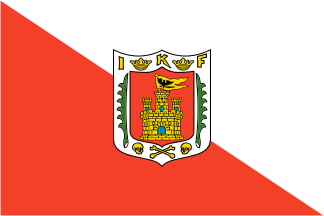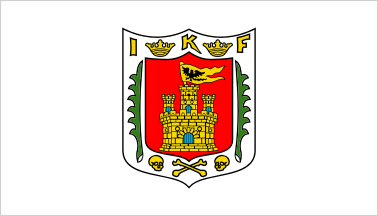
by Juan Manuel Gabino Villascán, October 06, 2001.
See: Flag of Tlaxcala

Last modified: 2005-03-12 by juan manuel gabino villascán
Keywords: mexico | tlaxcala | coat of arms | unofficial flag |
Links: FOTW homepage |
search |
disclaimer and copyright |
write us |
mirrors

by Juan Manuel Gabino Villascán, October 06, 2001.
See: Flag of Tlaxcala

|
4:7 |
|
by Juan Manuel Gabino Villascán, October 06, 2001. See: Coat of arms on white background: unofficial flags |
INEGI and SEP
Reported by Juan Manuel Gabino Villascán, October 06, 2001.
.gif)
by Juan Manuel Gabino Villascán, October 06, 2001.
The arms consist on a "French style" green-bordered red shield. It bears a yellow castle
resembling Castile (Spain) whose flag over the main tower shows the Austrian arms.
Over the border, at the top corners there are two golden initials "I" and "F" for the
Catholic Kings of Spain, Isabel (Elizabeth) and Fernando (Ferdinand) respectively;
between them the letter "K", also golden, for Karolus (Charles I of Spain and V of Germany)
who granted to Tlaxcala such arms; in both side two leaves, and in the bottom two
skulls and two crossed bones.
Juan Manuel Gabino Villascán, October 12, 2001
A couple years ago I have read in the FOTW pages about some unidentified diagonal red and white flag, said to have been seen in Veracruz by Spanish officials while the King and Queen of Spain were visiting Mexico. As long as I remember, FOTW said that it was seen in an indigenous town and that it was flown as a salute to their majesties by the Indians.
Later I recognized the same flag in the murals of the State Government Hall
in Tlaxcala (State of Tlaxcala), in a rather unusual image depicting the four
Indian lords of Tlaxcala riding their horses side by side as allies with the
Spanish conqueror to battle against the Aztecs.
History tells us that Tlaxcala was the only Indian Mexican nation that
officially supported the Spaniards all along the conquest, since that
alliance helped Tlaxcala to get rid of the domination menace they suffered
from the Mexicas (or Aztecs, as they are better known), and let them get a
privileged treatment by the Spanish.
Tlaxcala and Mexico were long time enemies and Spanish conquest became an
excellent opportunity for Tlaxcala to vanquish the Aztecs. Since then,
Tlaxcala has been held as a 'traitor' nation by official Mexican historians.
Official Mexican history, teached in primary schools, tells that Aztecs
were 'good', Spaniards were 'bad' and Tlaxcaltecas were 'traitors'.
History teached in the State of Tlaxcala tells that Aztecs were conquerors,
Spaniards were allies and that Tlaxcala won the war against Aztecs thanks to
Spanish support. This is opposed to what pupils learn all around the rest of
Mexico, but it is Tlaxcala's view of things.
So, and after asking a few historians, I think that red and white diagonal
flag seems to represent some kind of allegiance from Indians towards the
Spanish crown, at least in those regions Hernán Cortés crossed in his
campaign against the Aztecs (Veracruz, Puebla and Tlaxcala).
That flag had to be forbidden or, at least, 'secretly' flown, since that
allegiance from the Indians towards the Spanish crown is officially excluded
by Independent Mexican history. Indians and Spaniards officially had to be
eternal enemies.
This flag has had an important place only in the State of Tlaxcala (in the
murals of State Hall, at least and as long as I know), and it is
understandable that no Mexican officials (excepting those grown in Tlaxcala)
would know anything about the flag and its significance.
Now Tlaxcala has been governed for a few years by a left-wing opposition
party, which has used a new State motto: "Cradle of the Nation".
Many people wonder why Tlaxcala should be considered the cradle of the Mexican nation (a privilege usually reserved to Mexico City, whose Aztec foundation is depicted in the national flag and coat of arms), but the explanation is that if Tlaxcala is not the cradle of the official Aztec 'Mexicanity', it is indeed the first place where Indians and Spaniards worked, battled and melted together to form the present Mexican mixed ethnics.
The real news is that this semi-clandestine red and white diagonal flag, but now with the addition of the State of Tlaxcala Coat of Arms in its center, has begun to fly openly in public buildings, industries and touristic facilities in the State of Tlaxcala.
I do not know if it is official (I am sure Federal authorities would not like to authorize its use as a State Flag), I guess it is not, but I have been there just yesterday and I have seen it flying almost everywhere.
Gerardo Francisco Kloss Fernandez del Castillo, May 27, 2003